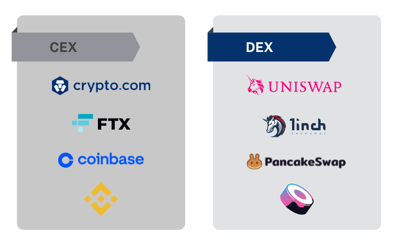The Evolution of Exchanges: Centralized vs. Decentralized
The rapidly evolving world of finance has been marked by significant milestones. One such transformative development is the inception and progression of exchanges, platforms that allow the trading of assets. These exchanges have come a long way from their initial, traditional forms to more modern, technologically advanced versions. At the heart of this evolution is a shift in paradigms - from centralized to decentralized models.
Centralized exchanges (CEXs), under the control of a single organization, have been prevalent for years. They have provided a secure, orderly environment for trading assets, be it stocks, commodities, or cryptocurrencies. However, the rise of blockchain technology has sparked a revolution in the way these platforms function, leading to the advent of decentralized exchanges (DEXs).
DEXs provide an alternative, democratized approach to asset trading, eliminating the need for an intermediary authority and instead using blockchain technology to facilitate direct peer-to-peer transactions. As we delve deeper into this topic, we'll examine the mechanics of both these models, their key features, and how innovators like Cybrid are transforming the trading landscape. Let's embark on this journey of understanding exchanges, their pivotal role in finance, and the future they are shaping.
The Mechanics of Exchanges and Liquidity
In the realm of finance, whether it's traditional or digital, an exchange is a marketplace where assets are traded. These assets could range from fiat currencies like the US Dollar (USD), to commodities like gold, and to digital assets, such as cryptocurrencies like Bitcoin and Ethereum. One key aspect of any successful exchange, regardless of the traded assets, is liquidity.
Liquidity, in this context, refers to the ready availability of an asset for buying or selling without significantly impacting its price. In simpler terms, it's the ease with which an asset can be converted into cash. For exchanges, maintaining liquidity in the variety of currencies they offer is paramount. The higher the liquidity for a particular currency, the smoother and more cost-effective it becomes to convert to or from it.

Centralized Exchanges (CEX): The Traditional Market Players
In both traditional finance and the digital asset market, centralized exchanges have been the backbone of asset trading. These exchanges, also known as CEXs, operate under the governance of a specific business or organization that maintains control over their operations, including the order book, and provides a standardized interface, typically through a Cryptocurrency Exchange API.
Cryptocurrency Exchange APIs are essential components of CEXs. They enable the interaction between different software, allowing users to obtain real-time price information, manage trades, and automate trading strategies. APIs serve as a way to ramp crypto <> fiat.
The lifeblood of a CEX is its order book. An order book is an organized list of buy and sell orders for a specific asset, sorted by price level. The functionality of the order book on a centralized exchange is usually confined to its users and a crucial group of participants known as market makers.
Market makers are entities or individuals who provide liquidity to markets by placing limit orders on the order book, effectively 'making a market.' In other words, they quote both a buy and a sell price in a financial instrument or commodity held in inventory, hoping to make a profit on the bid-offer spread, or turn. Market makers play a pivotal role in ensuring that trades occur smoothly and that price volatility is minimized, especially in less liquid markets.
Liquidity providers, on the other hand, are typically large-scale investors, financial institutions, or traders who supply capital to the exchange's markets. By providing this capital, they help reduce transaction costs (the bid-ask spread) and facilitate faster execution of trades. In return for their services, liquidity providers often receive rebates on trading fees or other incentives offered by the exchange.
These centralized exchanges bear many similarities with traditional stock markets or securities exchanges. They operate under a defined set of rules and regulations, ensuring security and transparency in their transactions. However, it's important to note that while they offer the advantage of familiarity and ease-of-use to many traders, they also carry potential risks, such as vulnerability to hacking.
In the rapidly evolving world of digital assets, CEXs continue to play a significant role in fostering market liquidity and stability. Their development and advancements in areas like API functionality, market making strategies, and liquidity provision are key to shaping the future of the crypto trading landscape.
Decentralized Exchanges (DEX): The Rising Challengers
In recent years, a new breed of exchanges has started to gain traction - decentralized exchanges or DEXs. These exchanges do not rely on any single organization or entity for ownership or funding. Instead, they harness the power of blockchain technology as a foundational infrastructure to manage and maintain order book activity.
These decentralized exchanges use a technology known as Automated Market Makers (AMMs) to facilitate transactions between buyers and sellers. An AMM is a type of decentralized exchange protocol that relies on a mathematical formula to set the price of a token. This formula can vary based on the specific protocol.
Different DEXs utilize various technical implementations for fulfilling orders. For example, some use a decentralized order book model where applications broadcast buy and sell orders. Others rely on liquidity pools with arbitrage opportunities to maintain a value peg. The funding of a DEX is typically open to the public, meaning that anyone can participate in providing liquidity, and in return, they may earn rewards such as transaction fees.
Uniswap, SushiSwap, and Curve are among the popular AMMs in today's cryptocurrency market. These platforms have made significant strides in making decentralized finance more accessible, further exemplifying the innovative possibilities of blockchain technology.
Innovating Exchanges with Cybrid: The Future of Trading
As the financial landscape evolves with the growing adoption of blockchain technology and digital assets, innovative solutions like Cybrid are setting new industry standards. With its cutting-edge technology and robust infrastructure, Cybrid offers more advanced functionality than traditional Crypto Exchange APIs.
One of the key features of Cybrid is its Smart Order Router. This sophisticated tool allows users to directly access multiple liquidity providers, effectively ensuring the best possible price for their trades. This is a significant advantage over traditional crypto exchanges that typically rely on a single source of liquidity. With Cybrid, you can confidently execute trades knowing that you're receiving the most competitive rates available in the market.
Beyond its advanced routing system, Cybrid also excels with its comprehensive digital wallet infrastructure. This facilitates easy deposits and withdrawals, streamlining the process of managing digital assets. It's a feature that doesn't just improve the user experience; it also plays a crucial role in accessing decentralized exchanges (DEXs).
DEXs, while revolutionary in their decentralization, can often be difficult to access for many users due to the technicalities involved. Cybrid's digital wallet infrastructure eliminates this complexity, making it easy for users to connect with and utilize DEXs. This simplifies the trading process and opens up a world of opportunities in the decentralized finance ecosystem.
In conclusion, whether you're interacting with traditional centralized exchanges (CEXs) or exploring the potential of decentralized exchanges (DEXs), Cybrid offers a developer-friendly, advanced solution that maximizes use case potential. Its blend of easy access to multiple liquidity providers, sophisticated smart order routing, and comprehensive digital wallet infrastructure offers a level of convenience and functionality that stands apart in today's fast-paced digital asset market. Cybrid is not just a platform; it's a game-changer, redefining the way businesses build & operate in the digital world.
